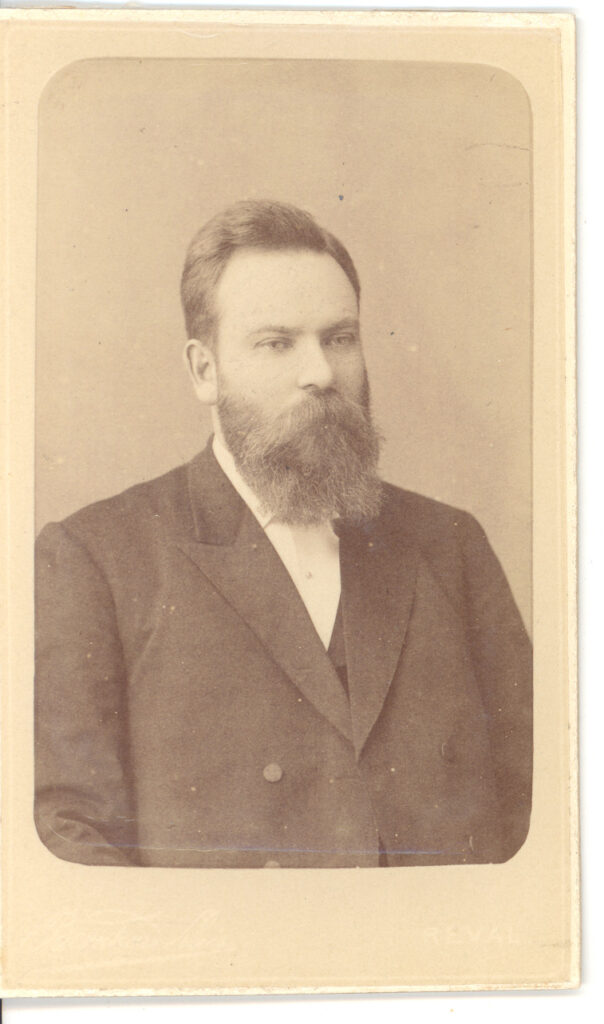
Jaan Bergmann

Poems
Jaan Bergmann (29/17 December 1856 – 25/12 June 1916) was a clergyman, poet and translator.
Bergmann was born in Kolga-Jaani parish. He attended school in Põltsamaa and Tallinn and studied theology at the University of Tartu. After graduation, Bergmann was Jakob Hurt’s assistant pastor in St. Petersburg and, from 1884 until his death, pastor of Paistu congregation in Viljandi County. He was a member of the permanent Bible revision committee formed in 1895 at the Synod of Livonia. Bergmann was a member of the Society of Estonian Men of Letters and edited the children’s magazine Lasteleht from 1901–1905. He died at Paistu and was buried in Paistu cemetery.
Bergmann’s poetry appeared predominantly in the press and was collected into the book J. Bergmanni laulud (‘J. Bergmann’s Songs’, 1901). The main themes of his mostly post-romantic poetry are homeland, nature and love. Bergmann was an outstanding lyroepicist. He drew the subject matter of his ballads from folk poetry and ancient Estonians’ struggle for their freedom — the most notable among such ballads is Ustav Ülo (‘Faithful Ülo’). Later, Bergmann mostly published works with a religious content.
Bergmann started translating as early as in secondary school; later he translated poetry of classical antiquity (including the ancient Greek parodic poem Batrachomyomachya), German poetry (F. Schiller’s Song of the Bell), Russian ballads and parts of the Bible (the New Testament and Psalms were published in 1912). He collected folk songs for Jakob Hurt’s folk song publication Vana Kannel (‘Old Zither’). Bergmann’s normative article Luuletuskunst (‘The Art of Poetry’) published in the yearbook of the Society of Estonian Men of Letters in 1878 is the first treatment in Estonian that describes and classifies the formal aspect of Estonian poetry. Bergmann was significant in the development of the language and form of Estonian poetry in the late 19th century. Jaan Bergmann was notable for his mastery of form, bringing hitherto little-known verse meters into Estonian poetry, such as the ancient Greek hexameter.
A. K. (Translated by I. A.)
Books in Estonian
Poetry
J. Bergmann’i laulud. Jurjev: M. Varesi rmtkpl, 1901, 328 lk. [2. trükk: 1923.]
Koidutäht ja teisi luuletusi. Koost. O. Kuningas. Tallinn: Eesti Riiklik Kirjastus, 1957, 71 lk.
Short prose
Ööwahi uus aasta. Tartu: H. Laakmann, 1897, 46 lk.
Kiigewere küla esimene koolmeister. Jurjev, 1898, 24 lk.
Miscellaneous
Üleüldine ajalugu. 1. jagu. Wana aeg. Tartu: Schnakenburg, 1879, 144 lk.
Üleüldine ajalugu. 2. jagu. Keskaeg. Tartu: Schnakenburg, 1880, 115 lk.
Piibel pagana kohtu ees. Revel: Jaan Bergmann, 1894, 15 lk.
Priiusepüha kõne. Viljandi: Viljandi Eesti Põllumeeste Selts, 1894, 18 lk.
Kodu-laste raamat. Tartu: 1890, 70 lk. [Järgmised trükid: 1891, 1892, 1895, 1898, 1900, 1902, 1906, 1912.]
Gustav Adolf. Tartu: Eesti Üliõpilaste Selts, 1895, 15 lk.
Neli ustawat tunnistajat ja muud. Tallinn, 1910, 16 lk.
Aga keda teie mind ütlete olewat?. Liiwimaa 77-da sinoidi awamisepäewa jutlus 24. Augustil 1911 Walga Luke kirikus. Tallinn, 1911, 15 lk.
Mis kasu toob meile Piibel?. Jurjev: Vahimees, 1912, 16 lk.


